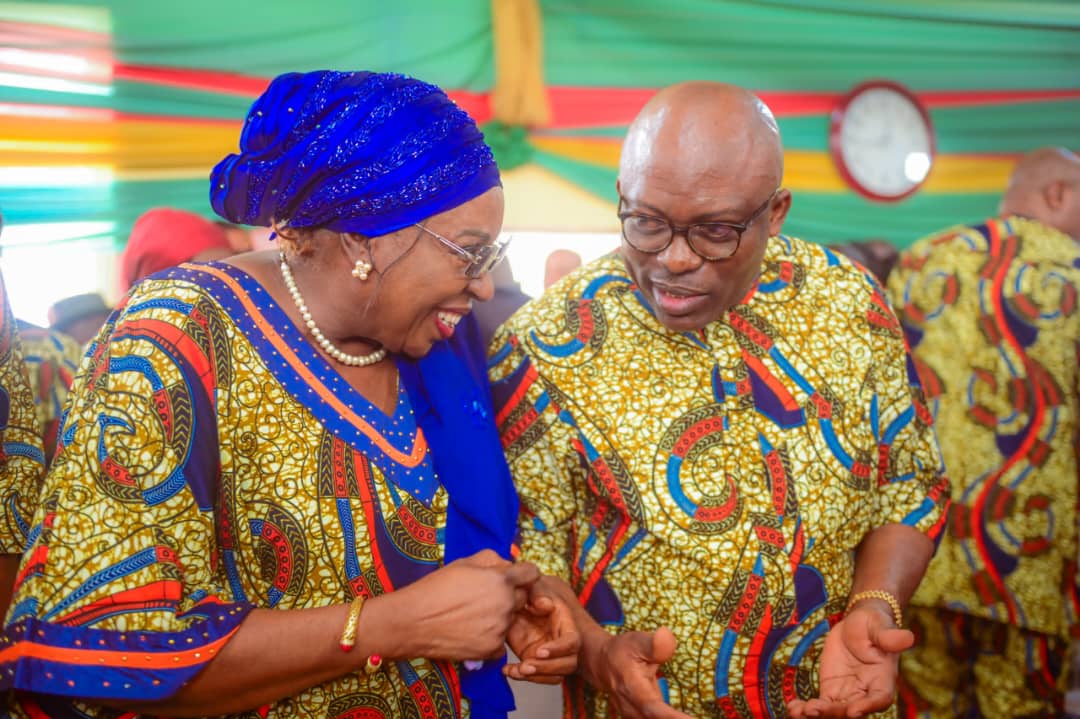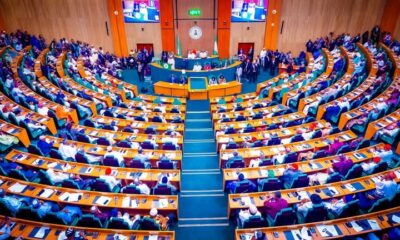News
NASS To Investigate UNN Students’ Protest
Apparently disturbed by the violent demonstration by students of the University of Nigeria Nsukka (UNN) which led to the immediate closure of the institution last Saturday, the Chairman, Senate Committee on Information and Media, Chief Ayogu Eze has called on National Assembly to investigate the remote and immediate causes of the upheaval to avoid further unrest at the university.
Senator Ayogu who spoke to reporters in Enugu, Sunday, condemned the ugly development at UNN, saying it was high time sanity was brought to the nation’s citadel of learning which he noted had been the pride of not only the South East, but the nation in general.
His words: “My attention has been drawn to the riot by Students of the University of Nigeria Nsukka on Saturday, January 16, 2010 leading to the destruction of valuable property. I condemn this action by the students in very strong terms. I have however studied the situation leading to this sad development and I have found out that the management of the university has a lot of questions to answer. The Vice Chancellor, Professor Bartholomew Okolo has been most inaccessible to the Students’ Union leadership and where he is, has been most intransigent in dealing with issues of administration”
According to him, “The immediate cause of the riot was an attempt to raise school fees by as high as 150 percent without, as it were, taking all stakeholders on board. As the Senator representing the area where the university is located, I know next to nothing about what is going on in the university. Since this riot broke out, I have called the Vice Chancellor over 20 times and sent text messages all of which have been ignored. Gone are the days when Vice Chancellors operated like mini-gods and looked down on everybody”, he stressed.
Chief Ayogu who did not hide his feelings during the chat further said, “If a senator can be ignored so brazenly, only God knows how this Vice Chancellor relates to his subordinates. I wish to ask the Committee on Education in the Senate and House of Representatives to conduct full hearing on this matter with a view to getting to the root of this matter”.
He also made it clear that the people of his district were also worried about reported moves by the Vice Chancellor and the school authorities to move out professional courses from the school, adding “We are major stakeholders in that university and refuse to be ignored in the affairs of the school”.
In a swift reaction, the embattled Vice Chancellor of UNN, Professor Barth Okolo, dismissed rumours making the rounds that a hike in school fees ignited the recent violent demonstration by students of the institution. Professor Okolo , who addressed newsmen at the Enugu Campus of the university, also insisted there was no time that the management of the institution proposed any hike in students school fees, maintaining that students did not organise the unrest. He accused some staff of the institution who contested the position of the vice chancellor with him of masterminding the protest that led to wanton destruction of properties of the institution, saying that the sponsors of the unrest were not happy with his administration’s giant strides within a short time. His words: “The protest was not caused by any hike in school fees. We never proposed any increment in school fees. We did not increase students’ schools fees. Students did not arrange the protest. Some miscreants who contested the position of the VC with me and failed arranged the protest. We have their names. They destroyed the new things that we brought to the institution. “As I said before, there is a process for school fees increment; it is not our work to increase school fees. The management has no powers to determine school fees. We assured the Student Union Government ( SUG) and other stakeholders that they will be informed when schools fees will be increased”, the embattled VC added. It would be recalled that students of UNN, Saturday January 16, 2010 embarked on violent demonstration destroying properties of the university worth millions of Naira which led to the immediate closure of the institution by the authorities of the school.
News
Retirement: Ignore PSC’s Directive, Remain In Office, IGP Tells Officers
The Inspector General of Police, IGP Kayode Egbetokun, has instructed all police officers affected by the recent directive from the Police Service Commission (PSC) to disregard the order.
The PSC had directed officers who have served 35 years or reached 60 years of age to retire immediately.
A wireless message from the office of the Force Secretary, dated February 11, 2025, stated that the IGP “strongly directs all officers affected by the PSC’s directive to stay action, pending further instruction.” Officers were told to comply strictly with this order.
Last week, PSC spokesman Ikechukwu Ani, explained that the commission’s order followed a review of its previous stance from the 24th plenary meeting in September 2017, allowing force entrants to use their enlistment date rather than their initial appointment date.
The commission cited inconsistencies with Public Service Rule No. 020908, which mandates retirement after 35 years of service or upon reaching 60 years of age.
However, the PSC clarified that it does not have the constitutional authority to determine the appointment or retirement of IGP Egbetokun.
News
Be Consoled, God Who Gives, Also Takes, Fubara Tells Principal Secretary

Rivers State Governor, Sir Siminalayi Fubara, has extolled the sterling motherly virtues of late Mama Ayebadieye Edward Igbeta, and urged the children not to deviate from those valuable lessons she had taught them.
Late Mama Ayebadieye Edward Igbeta (79 years) is the mother of Dr Ayebaesin Jacob Beredugo, the Principal Secretary to Governor Fubara.
The Rivers State Governor, who described Dr Beredugo as a brother, trusted ally and key stakeholder of his administration, urged him to be consoled in God and bear the loss with fortitude.
Governor Fubara gave the advise at the funeral service in honour of late Mama Ayebadieye Edward Igbeta at the Cathedral Church of St Luke, Anglican Communion in Nembe City, Nembe Local Government Area of Bayelsa State yesterday.
The Rivers State Governor said: “We are here as a government to show that in this difficult time, we stand with him. We know that there is no consolation here that can fill the gap of this loss, more especially the loss of a mother.
“But, we want to draw his mind to the good Book: that it is the Lord that giveth, and it is also the Lord that taketh. And he takes for a reason.
“We live in a corrupt world, and when you are a saint in the world, when it pleases the Almighty and He believes that He doesn’t want you to be corrupted, He takes away the soul to a better place where death is no more, where you don’t have to look for food again, where you have peace.”
Governor Fubara expressed strong belief that given the way Mama had lived and the good virtues that had been read out and said about her, there is no doubt that she will be in a good side in heaven.
The Governor decried the current condition of the cathedral where the funeral service held and committed the support of the Rivers State Government to ensure the completion of the building in memory of late Mama Ayebadieye Edward Igbeta
“We have been made to understand that the Cathedral needs strong support. We are willing to support the completion of the Cathedral. We will support the building in memory of Mama with the sum of N50million”
Delivering the sermon on the topic; “Hope in the face of death”, Bishop of the Diocese of Western Izon, Rt. Rev. Victor Okporu, said those who are confidently expecting positive future must also believe in Jesus Christ, repent of their sins, and be prepared to spend eternity with Him.
Reading the biography of the late Madam Ayebadieye Edward-Igbeta, brother of the decreased, Mr Godwin Ekine, said his late sister was an embodiment of love, care, peaceful and kind-hearted, and touched lives through her generosity and compassion.
Friends and well-wishers from Bayelsa, Rivers and Delta states, some of whom shared fun memories of the late matriarch, were later hosted to a funeral reception at King Koko’s Square in Nembe Town.
Also at the burial were the State Deputy Governor, Prof Ngozi Odu; Speaker, Rivers State House of Assembly, Rt Hon Victor Oko-Jumbo; member representing Ikwerre/Emohua Federal Constituency in the National Assembly, Hon Boniface Emerengwa; and Chief of Staff, Government House, Dr Edison Ehie.
Others are Head of Service, Dr George Nwaeke; Attorney General and Commissioner for Justice, Dagogo Israel Iboroma, SAN, Dr Tamunosis Gogo-Jaja; Chief Hanny Woko; Amaopusenibo Fubara Hart; Chief Theodore Georgewill; members of the State Executive Council; Special Advisers; top politicians, leaders and stakeholders in the State; among others.
News
Old Boys Plan Rehabilitation Of GSS, Okehi
The Chairman of the Old Boys Association of Government Secondary School (GSS), Okehi Etche, Rivers State, Prof. Sir, Umunna Offor, has stated that the association would soon visit their alma-mater and rehabilitate decayed infrastructure and facilities in the compound.
The chairman made this assertion while speaking with some newsmen after an extensive meeting of the Old Boys in Port Harcourt, recently.
Sir Offor stated that since they left the secondary school, some years ago, most of the facilities and infrastructure built by then Rivers State Government had decayed and worn out.
“ However, being responsible ambassadors and Old Boys of the college, we would not fold our arms and expect government to rebuild everything in the school compound, hence, we have decided to come together and graciously assist our alma mater’, he said.
“The meeting was basically for like-minds to gather to find a way to help the school, it is a thing of joy to see and receive old school friends and comrades who have gone far in life and have excelled in their respective chosen fields”.
Speaking in the same vein, Engr, Lasbrey Amadi; (FNSE), who is also an old boy and former member of the House of Representatives, said the association would be working in synergy with the administrators of the school to ensure that in no distant time; there would be a massive face-lift in the physical infrastructure in the school compound.
Veering into politics in Nigeria of today, Engr, Amadi, said that god-fatherism in politics had seriously killed the gains and beauty of democracy in Nigeria and quickly urged politicians to always play-down the issue of god-fatherism in politics and ensure good governance in the country.
In his comment, the Public Relations Officer (PRO) of the Association, Mr Goodluck Nwaobilor, said the door of the association is still wide open for new members who finished from the school to join and work towards taking the association to higher level.
-
Business2 days ago
Oil Production Resumption: Ogoni Youths Seek Inclusion In FG’s Plans
-
News4 hours ago
Monarch Asks Speculators To Avoid Minama Settlements
-

 Featured25 mins ago
Featured25 mins agoReps Propose Creation of 31 New States
-

 News2 days ago
News2 days agoSenate Reshuffles Committees, Appoints New Chairmen For Dev Commissions
-

 Nation2 days ago
Nation2 days agoBizman Alleges Threat To Life …Seeks Police , Govt’s Intervention
-
Nation2 hours ago
Group Plans Pilot Farm Programme For 50 Schools
-
Rivers2 days ago
NOSDRA D-G Disburses N150m To 300 Farmers In Rivers
-

 Niger Delta2 days ago
Niger Delta2 days agoOgoni Postgraduate Forum Tasks HYPREP On Scholarship Scheme

